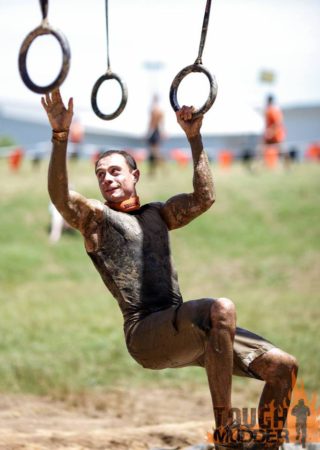
This is me at a Tough Mudder endurance event.
Have you ever considered doing an obstacle course race (OCR)?
These non-traditional fitness challenges have surged in popularity over the last five years or so, with many people looking for alternatives to events like triathlons, 5K’s, and marathons. Like more standard endurance races, OCR events vary in distance and difficulty as well. However, OCR events also include various obstacles that test your strength and coordination, like carrying heavy objects, climbing up ropes, scaling walls, or navigating Monkey bars (which are usually greased with mud).
In addition, OCR events usually also feature obstacles that test your nerve and your willingness to get wet and dirty. Examples include submerging in dumpsters full of slushy ice, jumping into water from platforms that are fifteen feet high, or crawling under barbed wire through thick pools of mud.
Speaking of mud, many of these races involve lots of it, although there are winter and cold-weather events that take place in the snow instead. No two OCR events are ever the same, even those put on by the same company. The obstacles change from race to race, and the locations change too. These races can occur in wooded areas, at sports stadiums, or at ski resorts- because the only thing more fun than skiing down a black diamond ski slope, is trying to run (i.e. walk) up one!
Have I sold you yet on these races? Haha.
I did my first OCR (a Spartan Race) in 2012. Since then, I have had a blast completing many others as well, including Savage Race, Tough Mudder, Toughest Ice (a cold-weather OCR in Sweden), and the Obstacle Course Racing World Championships, to name a few examples.
Regardless of whether or not you enjoy doing more traditional endurance races, this article features four reasons why your next (or first) race should be an obstacle course race. In a future article, I’ll give you a blueprint on how to prepare for and dominate an obstacle course race. For now, let’s just discuss why you would want to do one of these events in the first place. I hope I didn’t scare you off by mentioning the ice baths!
Note: If this is your first time at StrongerHabits.com, you can click here to take a free assessment that measures your habits in four areas that have a major impact on how you feel and perform each day. The assessment takes less than 3 minutes, and you get your results immediately.
- Obstacle course races can be more social and team-oriented.
While you could do a walk, a run, or a triathlon with a group, OCR events help you bond with friends, family members, or co-workers in a way that simply will not happen during a more traditional race. Many of the obstacles at these events require you to get or give help to your team members and other people on the course as well. This teamwork makes the experience more meaningful and memorable for everyone involved. In addition, if you lack the upper-body strength and/or the height to complete some of the obstacles, your teammates can help you out.
Having said that, you can certainly do these races on your own, if you prefer. Whether you want to do a race competitively and see how well you can do, or whether you just want to participate solo, that’s certainly an option. You don’t have to do these events with a group.
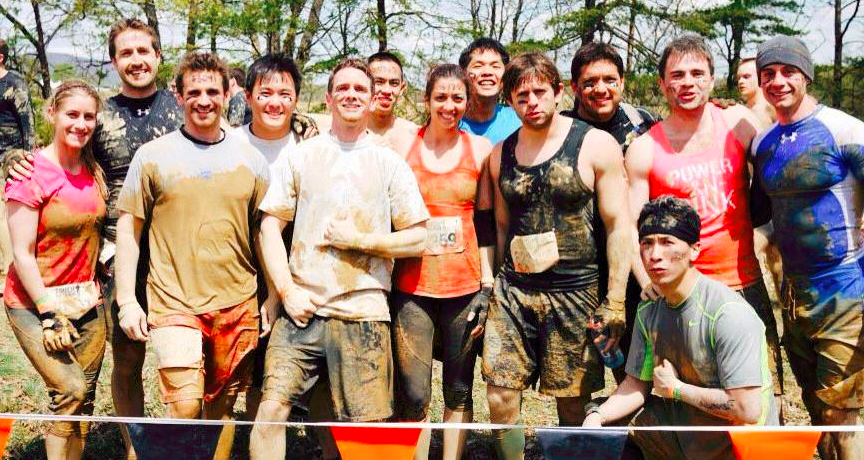
This is me (on the far right in a gray hat) and a group of friends during a Tough Mudder event.
- Obstacle course races feature more variety than traditional races.
If the thought of doing a triathlon or running a 5K, a half marathon, or a full marathon seems unappealing to you, you might be attracted to the variety that you will find in an obstacle course race. No matter which OCR event that you choose, you’ll rarely run more than one-quarter mile or one-half mile at a time before encountering a new obstacle. As a result, these events provide more variety than specialized events where you generally just do the same activity (i.e. run) for the entire time.
As Joe De Sena, CEO and Co-Founder of Spartan Race, says, “Very few people love running long distance. We make it easier in a sense that every quarter mile, there’s something to distract you from what you’re really doing—which is running.” 1
However, if you are among those who do like to run long distances, have no fear. Most obstacle course races are at least 3-5 miles long (some are much longer), so you’ll still cover a lot of terrain in these events as well.
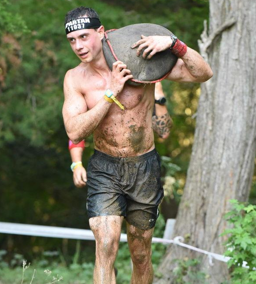
This is me carrying a sand bag during a Spartan Race.
- Obstacle course races encourage more balanced training.
Unlike a more specialized event (such as a half marathon) where a balanced training program is ideal but not mandatory, obstacle course race preparation requires a more diversified workout regimen that includes full-body strength training. Regardless of the distance, theme, or difficulty of the OCR event that you choose, you will need to be prepared to move weight and to crawl, push, and pull your body under, over, around, and through a variety of obstacles.
To adequately prepare for such an event, you need to train your entire body. This is beneficial for two key reasons. First of all, a more balanced training approach helps you build a stronger body from head to toe. Secondly, you’re less likely to develop overuse injuries, which are very common among people who train for specialized events.
For example, according to some reports, over 60% of all runners get injured in a given year. 2 The majority of these problems occur because of lopsided training programs that focus too much on doing one movement (i.e. when running makes up all or most of your exercise routine).
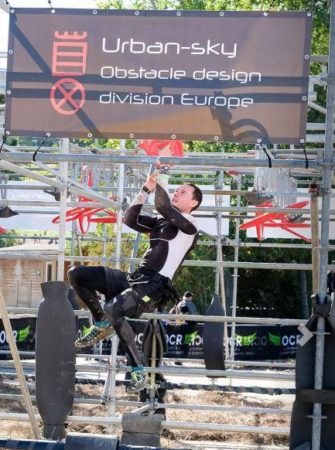
This is me navigating one of the more technical obstacles at The Obstacle Course Racing World Championships.
- Obstacle races challenge you in more ways than specialized events.
Will your grit and cardiovascular endurance be tested in a triathlon, a 5K, or a marathon? Absolutely. Will your balance, coordination, core strength, and upper body strength be tested in a triathlon, a 5K, or a marathon? Hardly or not at all.
Specialized events have their place. They are excellent if you want to test your grit and one specific area of your fitness (i.e. how fast you can run or walk a certain distance). However, if you want to test your grit and your overall fitness and athleticism (including your balance, coordination, endurance, and strength), OCR events are your best bet.
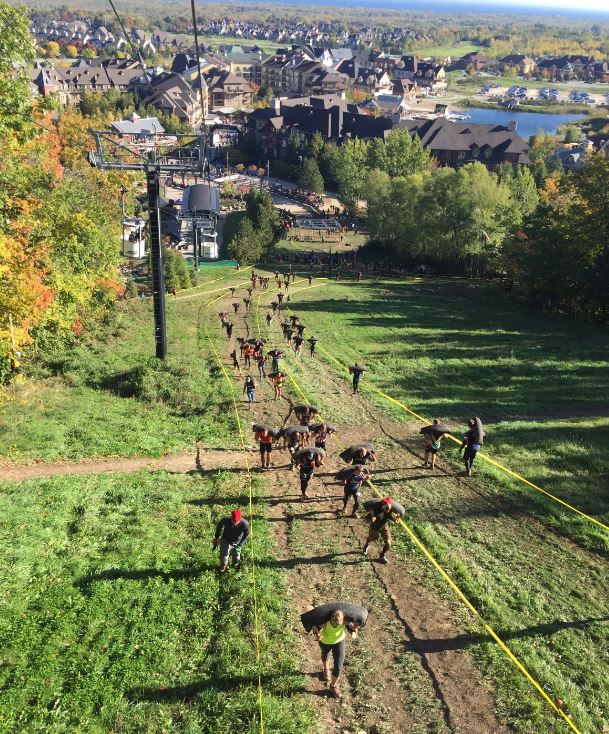
This was one of the many ski slopes at The Obstacle Course Racing World Championships. We had to carry a 50-pound sand bag up this slope. Definitely not my favorite obstacle!
Are obstacle course races dangerous? What if you are a beginner?
If you are intimidated about doing one of these events, recognize that they are designed to accommodate people of all fitness levels. As Sam Abbitt, CEO at Savage Race, told me in an interview for Work Stronger, “Some people have a misconception that everyone at our events is a great athlete in excellent shape. While we do have many people who fit that profile, there are a lot of everyday, normal, average Joe’s who run in our events too.”
At any OCR event, few people will be able to complete all of the obstacles. Keep in mind that each obstacle is optional as well. If you come to an obstacle that you are not comfortable with, you do not have to try to do it. While skipping an obstacle or failing to complete it will result in a penalty in a competitive wave, all obstacles are optional when you participate in a recreational wave– which is the way that the large majority of people do these races.
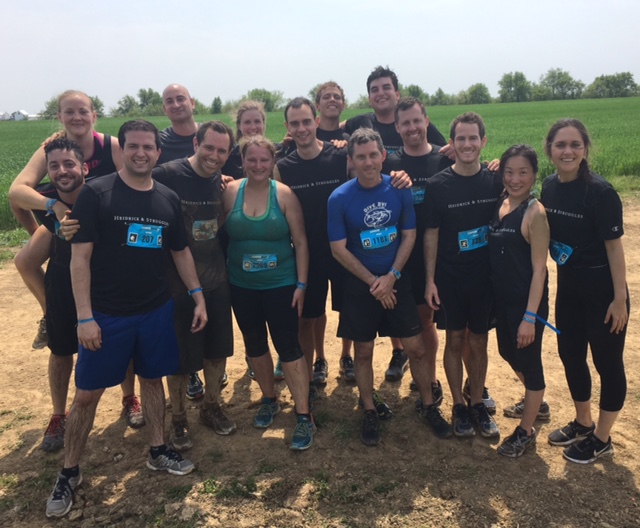
This is a photo of me and a group of co-workers during a Savage Race. It was the first race for most of the group, and everyone finished injury-free!
Summary
Obstacle course races can be a powerful way to bond with friends, family members, and co-workers. They also feature more variety than traditional fitness challenges, they encourage more balanced training, and they test you in more ways than traditional races.
If these events seem intimidating, remember that they are designed to accommodate people of all fitness levels, and there are events of different distances and difficulties. In addition, you are always allowed to skip an obstacle if you are not comfortable trying to complete it. Why not give each one a try though? You might surprise yourself with what you are able to do!
P.S. If you enjoyed this article, check out my free 40-page eBook and newsletter below.
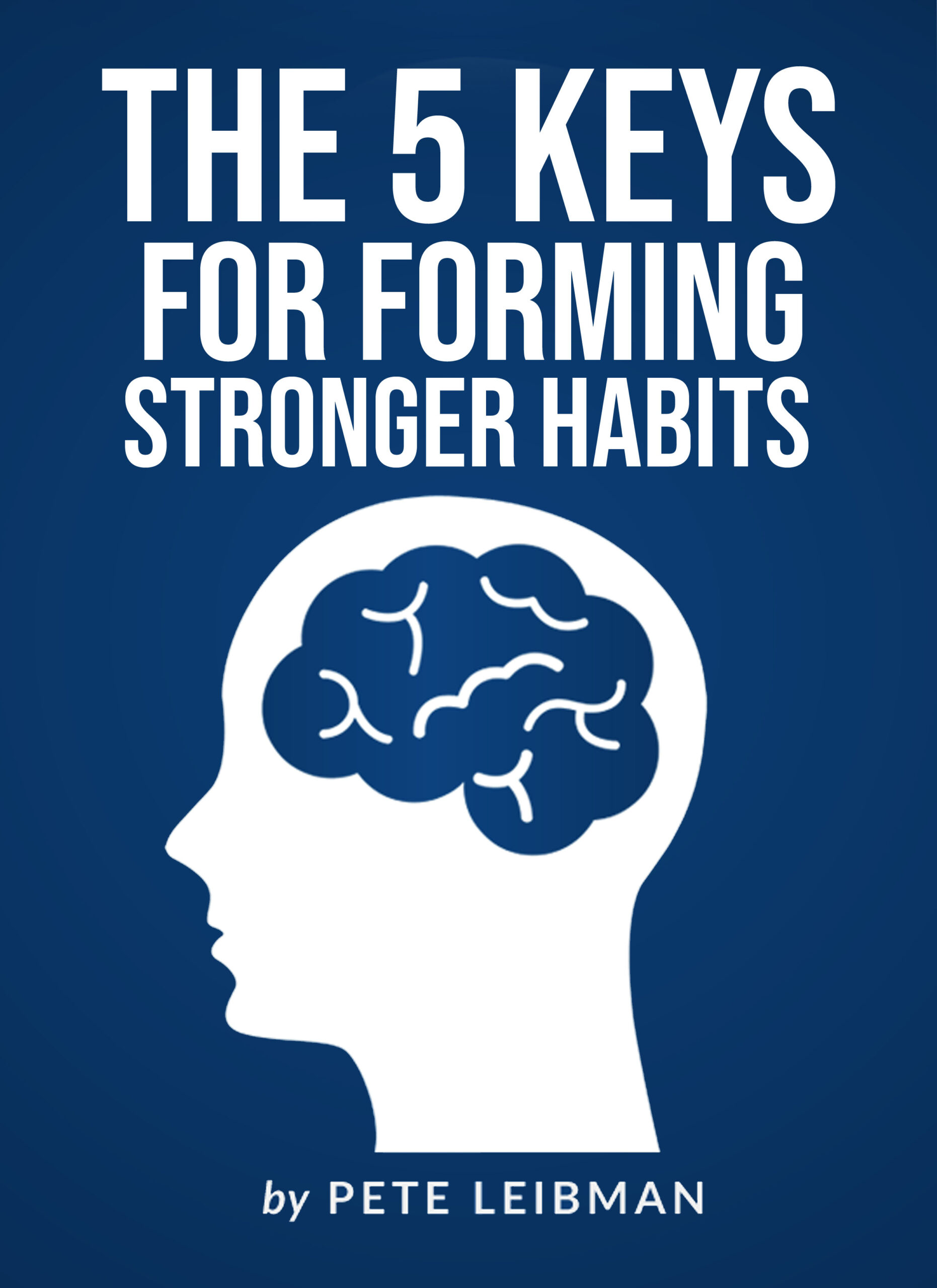
Free eBook and Newsletter
Download my free 40-page eBook on “The 5 Keys for Forming Stronger Habits.”
You’ll also receive my free weekly newsletter on how to become your strongest self.
Your email is safe. Unsubscribe anytime.
About the author: Pete Leibman is the Creator of StrongerHabits.com. He is a best-selling author, keynote speaker, executive recruiter, athlete, and peak performance coach. His work has been featured on Fox News, CBS Radio, and CNNMoney.com, and over 500,000 people across the world have read his articles.
References for this article:
- Schuckles, Erica. “The Rise of Obstacle Course Races,” Active.com, accessed on June 15, 2018, https://www.active.com/running/articles/the-rise-of-obstacle-course-races.
- “Cross Country Running,” Sports Medicine & Athletic Related Trauma SMART Institute, 2010, http://health.usf.edu/nocms/medicine/orthopaedic/smart/pdfs/sports_specific/cross%20country.pdf.

